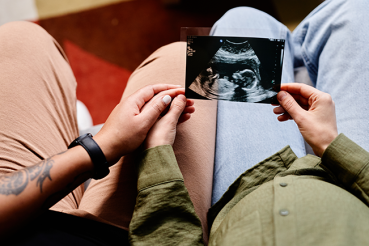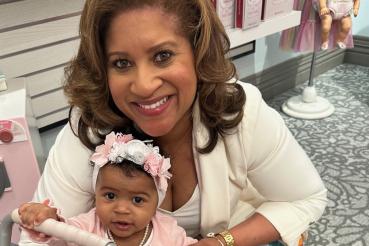Pregnancy and birth are both joyful and challenging touchpoints in every family’s life. Yet this occasion can be burdened with complications and fear for women of color.
According to the Centers for Disease Control and Prevention, approximately 700 U.S. women die each year due to a number of pregnancy or delivery complications — the worst rates of maternal mortality in the developed world. Black women are three to four times more likely to die from pregnancy-related causes compared to white women. Black women are also twice as likely to suffer from life-threatening complications associated with pregnancy. In Chicago, these disparities are even worse.
In a country known for its excess spending on health care, it is unacceptable that American women and women of color are losing their lives during pregnancy, childbirth and during the postpartum period. In recognition of Black Maternal Health Week and the unrelenting need to shed light on these deplorable mortality outcomes, leaders across Rush University Medical Center paused to answer the question: What does Black Mamas Matter mean to you?
Resilience
As a nurse who spent eight years in the Neonatal Intensive Care Unit and over 20 years in community-based hospitals providing care to mothers and newborns, I have witnessed firsthand the devastating impact of disparities in care and outcomes. I also have witnessed the beauty and resilience in Black mamas who have done everything in their power to keep themselves and their families healthy despite overwhelming adversity.
As health care professionals, we can no longer dispute the irrefutable evidence that our current models of care are suboptimal, influenced by implicit and explicit biases and linked to structural racism.
For example, in maternity care, the use of race-based algorithms that systematically assign lower scores based upon race can worsen health inequities. The Vaginal Birth After C-section (VBAC) Calculator is an example. The mother’s race is factored into the equation and lowers her score. The lower the score, the higher the likelihood that the mother will receive another C-section. There are known complications related to C-section delivery (potential bleeding, infection, longer recovery time, higher risk in future pregnancies) that disproportionately burden Black mamas who receive C-sections at higher rates than mothers of other races. The VBAC calculator increases the disadvantage for Black mamas, just because of her race.
As health care professionals, we must continually question how race is operating in health care and how we are either contributing to or addressing disparities in Black maternal outcomes. We cannot be complicit by our silence.
Wrenetha Julion, PhD, MPH, RN, Professor and Chair, Rush University College of Nursing
Potential
Why do Black mamas matter to us? Black mamas matter because they produce greatness. Some of the greatest minds, thoughts, discoveries, inventions and creativity come from people of color, and those individuals were born from Black women: Dr. Martin Luther King, Jr., Michelle Obama, Maya Angelou, George Washington Carver and so many others. Without their mothers, we would not have benefitted from their varied contributions that greatly advanced the welfare of people in the United States.
Yet even with their great contributions, there is potential for even greater. Therefore, it becomes vital that we continue to advocate for the safety of Black Mamas and their babies through the journey of childbirth and the preceding factors that lead to safe pregnancy, which includes healthy environments, access to health care, quality education, economic stability, and social and community context that is free of bias and racism.
There are so many more discoveries, inventions and great minds yet to be realized. It can start with the way we educate the next generation of health care professionals to advocate and create policy based in social justice and health equity. It is imperative that health care is transformed to decrease the abysmal maternal mortality rate that exists now, so that great potential continues to be born. That’s why Black mamas matter to us.
Christie Lawrence, DNP, RNC-NIC, Rush University College of Nursing
Ramona Hunter, DNP, RN, Rush University Collage of Nursing
Responsibility
I recently had a patient say to me in clinic, “I am so afraid to die in the hospital that I can’t sleep at night.”
She was 32 weeks pregnant, and this was not an expression of anxiety, nor an exaggeration of the normal having-a-baby-jitters. This was a fear based on reality. A fear based on data that shows that a Black woman is three times more likely to die in the first 42 days after giving birth than her white counterparts. This college-educated Black mom was at 60% greater risk for a maternal death than a white woman with less than a high school education.
I am a Latina OB-GYN, and Black Mamas Matter means to me that we can do better and need to do better. As health care providers, we have a responsibility to improve the medical care that is received by women of color. To do this we must first recognize the areas that continue to promote systemic racism within health care institutions. The advancement of health and birth equity should be at the core of all of our discussions of patient safety and quality improvement.
Our Department of Obstetrics and Gynecology is committed to making strides in this area — we know that the time is now and the need is undeniable. We encourage conversations that help us to come to terms with our own biases and allow each other and ourselves grace in the process.
Black Mamas Matter urges me to listen better, acknowledge fears, engage patients in their birth process, and empower and be empowered by their voices.
Elizabeth Yepez, MD, OB Patient and Safety Officer, Division Director Generalist Group, Rush Associates in Women’s Health
Centering Strength
Women are the backbone of so many families; the strength of a family comes from mothers.
Our efforts with Family Connects help to support women where we can and from where they are, with knowledge and resources. In doing so we strengthen mothers, their children, families and whole communities.
As providers of care, we need to acknowledge, be more aware, know the evidence behind our practices and, most of all, listen to women.
Jennifer B. Rousseau, DNP, WHNP-BC, Assistant Professor, Rush University College of Nursing
Advocacy
The disparities in maternal health outcomes experienced by communities of color in this country are unacceptable. In Illinois, these women are six times more likely to experience poor pregnancy outcomes than women of other ethnicities. To address these disparities and improve outcomes we must commit ourselves to advocating for improvement at every level.
We can celebrate the recent win in Illinois, which extends coverage for postpartum care to one year for Medicaid recipients. This is a wonderful example of the importance of advocacy at the policy level, which is what's needed to create real change and sustainable improvements. As health care workers, we must work tirelessly to ensure access to quality care for women and babies and fight for racial equity in this sphere.
Yasmin Cavenagh, DNP, MPH, RN, Assistant Professor, Department of Women, Children and Family Nursing, Rush University College of Nursing
Vigilance
Ever had a moment when something made you go, “Hmmm”?
The other day, I saw a really rare event. An event so incredibly rare that I was impressed in the show of courage, determination and strength. She walked slowly up and down the hallway. Quick panting, followed with a turn to the rail, forward lean, rhythmic sway of hips, followed by a squat only to be repeated a couple minutes later. All this as she is encouraged by her partner and Doula. I hear words of encouragement as staff pass by. She smiles, but quickly gets back to the business of work. Captivated, I smile.
As a daughter, mother and nurse, I bear witness to the resilience of women giving birth. In these moments she focuses on herself and looking forward to meeting her baby. If she is a woman of color, statistically, the odds are against her. As health care providers, we have a responsibility to listen to women, vigilantly watch over them, provide access to resources and diminish all the systemic barriers minimizing their experience. So, as I think of Black Mamas Matter, I think of the accountability and responsibility of the system to empower women in the safe passage of their precious baby. As clinicians we should stand in awe in the privilege of aiding and witnessing this.
Denise E. Banton, MS, RNC-OB, Unit Director of Labor and Delivery, Rush University Medical Center
Validation
Do you see me? Are you listening? I am worried. Will you understand? I need help. Do you see my baby? How she is my treasure? I am so proud. My baby is strong. I cannot lose him. Can I trust you?
Thinking about Black Mamas Matter, my mind flashed to one family after another, of mothers. I’ve been honored to share in promoting the health of their babies and children, and mothers from whom these sentiments would surface in one fashion or another. I think about how the beauty of parenting — attention, wonder and admiration, coupled with the worry about providing, caregiving and health — gets compounded by outside forces that women of color have to face more often because of our systems and structures that are rooted in racism, one of the most powerful traumatic forces in humankind, and its propagation of inequities.
There is an understanding in the science of trauma and resilience that the consistent presence of at least one supportive caregiver can counteract the trauma a child experiences — and nurture their resilience. Time and again this means a mother or grandmother, a father or grandfather, who are in turn buffered by their supportive caregiver, and so on. This is the interconnectedness that defines resilience.
Being resilient carries an edge, however. If a person or community is seen as resilient, we may feel relieved, and think, “They’re okay. They won’t need support.” But it is precisely when those supports fall away, shift focus or lose their buffers that resilience can wear away too, and the physical and emotional effects of trauma may emerge, dominate and perpetuate cycles of trauma and disadvantage.
Black Mamas Matter is validation of the concept that we must model our care on interconnectedness. We must care for each other, starting with validation of hopes, fears, needs and dreams that are expressed to us when we care for others and not ending until we can dismantle and replace systems that care inequitably with systems that care equitably.
Gina Lowell, MD, MPH, Director of Community Health for Pediatrics, Rush University College of Nursing




